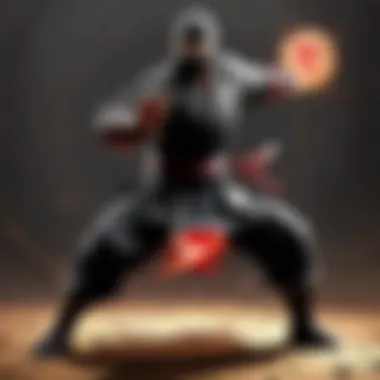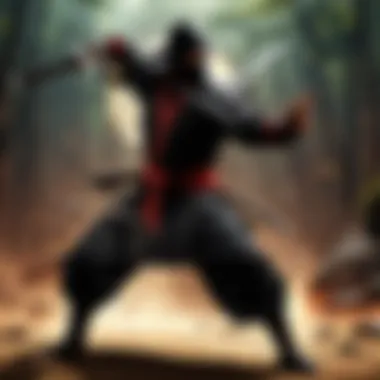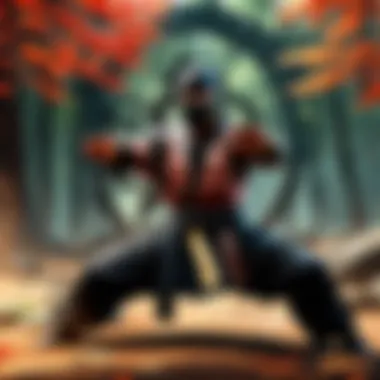Unlock the Secrets of Ninjutsu Martial Arts Near You


Character Profiles & Movesets
When delving into the realm of ninjutsu martial arts, understanding the character profiles and movesets becomes imperative. It is crucial to grasp the intricate background and stories of these martial artists to truly appreciate their craft. Exploring the signature moves and special abilities unique to each practitioner allows for a deeper appreciation of the art form. Tips on executing combos and finishing moves are key in mastering the nuances of ninjutsu, enhancing one's proficiency and skill set.
Gameplay Strategies & Tactics
In the pursuit of mastering ninjutsu martial arts, developing effective gameplay strategies and tactics is paramount. Whether engaging in training sessions or combat scenarios, having a strategic approach tailored to different situations and opponents is crucial. Understanding the nuances of countering opponents and maximizing damage output are essential elements for success. Insights on game mechanics and strategies for specific matchups provide a competitive edge, honing skills and enhancing overall gameplay performance.
Storyline & Lore Explorations
Exploring the rich narrative tapestry of ninjutsu martial arts unveils a world of intrigue and depth. Analysis of the overarching plot and subplots within the realm of ninjutsu provides insights into the complexities of character relationships and story developments. Delving into the lore and history behind this ancient art form offers a deeper understanding of its cultural significance and evolution. Speculating on upcoming story arcs and potential character crossovers adds an element of anticipation and excitement to the narrative exploration.
Updates & Patch Notes
Staying abreast of the latest updates and patch notes is essential for practitioners and enthusiasts of ninjutsu martial arts. Coverage of the newest updates, patches, and DLC releases offers valuable insights into the evolving landscape of the art form. Analysing the impact of new characters, stages, and gameplay changes provides a comprehensive overview of the shifting dynamics within the ninjutsu community. Comparing pre and post-patch gameplay mechanics aids in adapting strategies and tactics, ensuring continued growth and adaptability within the martial arts domain.
Introduction to Ninjutsu
Ninjutsu, the ancient art of the ninja, holds a profound significance in the realm of martial arts. This section delves into the core elements, benefits, and considerations related to the introduction of Ninjutsu. Understanding the essence of this traditional Japanese martial art requires a deep exploration of its history, principles, and unique tenets. Dive into the world of Ninjutsu to unravel its mysteries and uncover its timeless wisdom.
Understanding Ninjutsu
In the realm of Ninjutsu, the history serves as the foundation upon which this intricate martial art stands. The evolution of Ninjutsu through the centuries has shaped its techniques and philosophies into what we recognize today. Exploring the historical context allows practitioners to grasp the depth and complexity of Ninjutsu, shedding light on its cultural significance and practical applications.
History of Ninjutsu
The history of Ninjutsu offers a gateway into the world of ancient Japanese espionage and combat strategies. Delving into the roots of Ninjutsu unveils a tradition steeped in secrecy, precision, and adaptive tactics. Understanding the historical development of Ninjutsu provides practitioners with insights into the diverse skills and stealth techniques encompassed within this martial art.
Philosophy and Principles
Central to Ninjutsu are its underlying philosophies and core principles. The philosophical framework of Ninjutsu delves into concepts of harmony, perseverance, and self-improvement. By embracing these principles, practitioners not only enhance their combat skills but also cultivate a holistic approach to personal development and introspection.
Different Ninjutsu Schools
Within the realm of Ninjutsu exist diverse schools, each offering a unique perspective on this ancient martial art. These schools vary in their emphasis on particular techniques, training methodologies, and historical lineages. Exploring the different Ninjutsu schools provides practitioners with a broader understanding of the art and opens avenues for specialized training and growth.
Benefits of Practicing Ninjutsu


The practice of Ninjutsu goes beyond physical training, encompassing a holistic approach to personal development and self-defense. This section highlights the multifaceted benefits of engaging in Ninjutsu training, ranging from physical fitness improvements to mental discipline honing.
Physical Fitness
Ninjutsu training promotes physical fitness through a combination of cardiovascular exercises, strength conditioning, and flexibility routines. The dynamic nature of Ninjutsu techniques challenges practitioners to enhance their agility, stamina, and overall physical well-being. Engaging in Ninjutsu not only improves physical health but also cultivates a balanced and resilient physique.
Self-Defense Skills
At the heart of Ninjutsu lies the cultivation of self-defense skills essential for protecting oneself in various life situations. The art of Ninjutsu equips practitioners with practical techniques for neutralizing threats, enhancing situational awareness, and confidently navigating stressful encounters. Mastering self-defense through Ninjutsu empowers individuals to safeguard their well-being and that of others.
Mental Discipline
Ninjutsu training fosters mental discipline by cultivating focus, mindfulness, and strategic thinking. The mental fortitude gained through consistent practice allows practitioners to navigate challenges with clarity and composure. By honing mental discipline, individuals not only excel in martial arts but also carry these valuable traits into their everyday endeavors, fostering resilience and adaptability.
Finding Ninjutsu Martial Arts Near Me
In this section, we delve into the critical aspect of finding Ninjutsu martial arts near the reader's location. To embark on a journey of mastering this ancient Japanese art, locating reputable dojos is paramount. By understanding the significance of proximity and access to quality training, individuals can immerse themselves in the rich culture and techniques of Ninjutsu. The process of finding a suitable dojo involves thorough research and evaluation to ensure the best learning environment.
Researching Local Dojos
Researching local dojos is a fundamental step in exploring Ninjutsu martial arts nearby. Whether through online searches, local community centers, or word of mouth recommendations, each method offers unique advantages in discovering potential training spaces. The importance of researching lies in identifying a reputable and compatible dojo that aligns with individual goals and preferences. By examining different sources of information, practitioners can make informed decisions regarding their Ninjutsu training journey.
Online Search
Conducting an online search is a convenient and efficient way to explore Ninjutsu dojos in the vicinity. Online platforms provide a wealth of information on available classes, schedules, instructor profiles, and reviews from current or former students. This digital approach offers accessibility and insight into the dojo's reputation and teaching style, aiding individuals in narrowing down their choices effectively. While online searches facilitate initial screening of dojos, it's essential to verify the accuracy of information and supplement it with firsthand experiences.
Local Community Centers
Local community centers serve as valuable hubs for finding Ninjutsu dojos within the neighborhood. These centers often host a variety of martial arts classes, including Ninjutsu, providing a convenient option for individuals seeking local training opportunities. By exploring offerings at community centers, practitioners can connect with instructors, assess teaching approaches, and gauge the suitability of the facilities for their training needs. Additionally, community centers may offer cost-effective options for beginners or those looking to explore different martial arts disciplines.
Word of Mouth Recommendations
Word of mouth recommendations play a significant role in discovering reliable Ninjutsu dojos nearby. Testimonials and personal experiences shared by friends, colleagues, or fellow martial arts enthusiasts offer genuine insights into the quality of training, teaching methods, and overall atmosphere of the dojo. Leveraging word of mouth referrals allows individuals to tap into trusted networks for recommendations tailored to their preferences and learning objectives. This interpersonal approach adds a layer of authenticity and reliability to the dojo selection process, highlighting the power of community feedback in shaping training decisions.
Choosing the Right Ninjutsu Dojo
Selecting the right Ninjutsu Dojo is a critical decision for any practitioner. The quality of instruction, the class atmosphere, and membership costs all play a vital role in this selection process. Ensuring that the Dojo aligns with your goals and values is essential to your growth in Ninjutsu. Quality instruction is the backbone of any Dojo, as it determines the level of skill you will attain. Furthermore, the class atmosphere directly impacts your training experience, shaping your mindset and commitment. Lastly, understanding membership costs and commitments helps you plan your financial and time investment efficiently.
Quality of Instruction


Certifications and Lineage
Certifications and lineage hold immense significance in the world of Ninjutsu. A reputable Dojo should have certified instructors with a clear lineage tracing back to authentic Ninjutsu masters. This ensures that you are learning from knowledgeable and experienced professionals who follow traditional teachings. A strong lineage guarantees that the techniques and principles taught are authentic and rooted in centuries-old tradition. Understanding the lineage also provides insight into the evolution of techniques and philosophies within a specific Ninjutsu school.
Teaching Methods
The teaching methods employed by a Dojo greatly influence the learning experience. Effective teaching methodologies can accelerate your progression and comprehension of Ninjutsu techniques. A good Dojo utilizes a combination of demonstration, practice, and feedback to enhance your skills. Clear explanations and personalized guidance can help you overcome challenges and refine your techniques effectively. Understanding the teaching style of a Dojo is crucial in ensuring that it aligns with your learning preferences and objectives.
Student Progression
The progression of students within a Dojo reflects the effectiveness of its training programs. A structured system of student progression denotes a clear path from beginner to advanced levels. Tracking your progress through various ranks and certifications motivates continuous improvement and goal setting. A transparent progression system fosters a sense of achievement and ensures that you are consistently challenged to grow. It is essential to inquire about the criteria for advancement and how student progress is evaluated in the chosen Dojo.
Class Atmosphere and Culture
Inclusivity
Inclusivity in a Ninjutsu Dojo denotes openness to students of diverse backgrounds and abilities. An inclusive environment welcomes individuals regardless of age, gender, or physical fitness level. This fosters a sense of belonging and encourages mutual support among practitioners. Inclusive practices promote a supportive community where everyone can thrive and learn together.
Respect and Discipline
Respect and discipline are fundamental values in Ninjutsu training. A reputable Dojo instills a culture of respect towards instructors, fellow students, and the art itself. Discipline is cultivated through adherence to traditional practices, etiquette, and focused training. Mutual respect creates a harmonious training environment where each individual is valued for their dedication and contribution. Upholding the principles of respect and discipline enhances the overall experience and benefits of practicing Ninjutsu.
Sense of Community
A strong sense of community is vital in a Ninjutsu Dojo. A supportive community motivates you during challenging times and celebrates your achievements. Building relationships with fellow practitioners creates a network of like-minded individuals who share your passion for Ninjutsu. Additionally, a sense of community fosters a spirit of collaboration and camaraderie, enhancing the overall training atmosphere. Engaging with the community provides opportunities for growth, learning, and shared experiences.
Membership Costs and Commitment
Membership Fees
Membership fees are an essential consideration when selecting a Ninjutsu Dojo. Understanding the cost structure and payment frequency helps you plan your budget effectively. Compare membership fees across different Dojos to ensure you are receiving fair value for the instruction and facilities provided. Transparent pricing policies reflect the honesty and professionalism of a Dojo, ensuring that there are no hidden costs or surprise charges.
Contract Terms
Reviewing contract terms is crucial before committing to a Ninjutsu Dojo. Contracts outline the rights and responsibilities of both the student and the institution. Pay attention to the duration of the contract, cancellation policies, and any additional fees mentioned. Clear and fair contract terms promote a healthy student-teacher relationship based on mutual understanding and trust.
Additional Expenses
Inquire about any additional expenses associated with training in a Ninjutsu Dojo. These expenses may include equipment costs, uniform fees, grading examination fees, or seminar charges. Understanding the full extent of the financial commitment allows you to assess the total cost of training in Ninjutsu. Budgeting for additional expenses ensures that there are no financial surprises during your training journey.


Embarking on Your Ninjutsu Journey
Embarking on your ninjutsu journey is a pivotal step in mastering this traditional Japanese martial art. As you set foot on this path, you open yourself to a world of discipline, skill development, and historical richness. Setting clear training goals will be paramount to your progress in ninjutsu, guiding you towards continuous improvement and mastery of techniques and principles. It is through dedication and persistence that you will truly embark on a meaningful ninjutsu journey.
Setting Training Goals
Short-Term Objectives
Short-term objectives function as stepping stones in your ninjutsu training, allowing you to focus on immediate skill development and progress tracking. By setting specific short-term goals such as mastering a particular technique or increasing physical stamina, you enhance your overall training experience and maintain motivation. The beauty of short-term objectives lies in their ability to provide tangible achievements within a relatively short time frame, fostering a sense of accomplishment and drive.
Long-Term Aspirations
On the other hand, long-term aspirations in ninjutsu serve as guiding stars, directing your training towards overarching goals such as attaining a black belt or becoming a proficient instructor. Long-term aspirations instill a sense of purpose and longevity in your practice, encouraging sustained commitment and perseverance. By envisioning your ultimate ninjutsu goals, you nurture a deep-rooted motivation that transcends daily challenges, propelling you towards excellence.
Progress Tracking
Tracking your progress in ninjutsu is essential for self-improvement and goal realization. By monitoring your advancements in techniques, physical abilities, and mental resilience, you gain valuable insights into your strengths and areas for growth. Progress tracking not only allows you to celebrate achievements but also empowers you to make informed adjustments to your training approach. Through meticulous progress tracking, you pave the way for continuous development and mastery in ninjutsu.
Committing to Practice and Progress
Regular Attendance
Maintaining regular attendance at ninjutsu classes is fundamental to your growth and proficiency in this martial art. Consistent participation ensures that you receive continuous instruction, practice opportunities, and feedback from experienced instructors. By prioritizing regular attendance, you establish a routine that fosters discipline, skill retention, and community engagement within the dojo.
Consistent Effort
Consistent effort in your ninjutsu practice is the cornerstone of progress and skill refinement. By dedicating yourself to consistent training sessions, you cultivate muscle memory, mental focus, and technical expertise. Consistent effort epitomizes dedication and resilience, enabling you to overcome challenges, learn from mistakes, and evolve as a ninjutsu practitioner.
Seeking Feedback
Actively seeking feedback from instructors, peers, and mentors in ninjutsu is vital for your development and learning journey. Constructive feedback offers valuable perspectives, insights, and corrections that can refine your techniques and enhance your overall performance. By embracing feedback with an open mind and a thirst for improvement, you demonstrate a growth mindset and a commitment to continuous learning in the art of ninjutsu.
Continuing the Legacy of Ninjutsu
Respecting Tradition
Respecting the traditions of ninjutsu acknowledges the centuries-old lineage, values, and practices that form the foundation of this martial art. By honoring tradition, you connect with the rich history and cultural significance of ninjutsu, embodying the respect and discipline inherent in its teachings. Respecting tradition fosters a sense of heritage and authenticity in your practice, anchoring you to the roots of ninjutsu.
Sharing Knowledge
Sharing knowledge within the ninjutsu community contributes to a culture of learning, growth, and collaboration among practitioners. By exchanging insights, techniques, and experiences with fellow students and instructors, you enrich the collective wisdom and skill base of the dojo. Sharing knowledge cultivates a supportive and dynamic learning environment, where mentorship and camaraderie flourish, nurturing individual and collective advancement.
Contributing to the Community
Contributing to the ninjutsu community extends beyond personal practice, encompassing active involvement, support, and engagement with fellow practitioners. By volunteering, organizing events, or assisting in classes, you strengthen the bonds within the ninjutsu community, fostering inclusivity and mutual respect. Contributing to the community nurtures a sense of belonging and camaraderie, sustaining the enduring legacy of ninjutsu for future generations.







